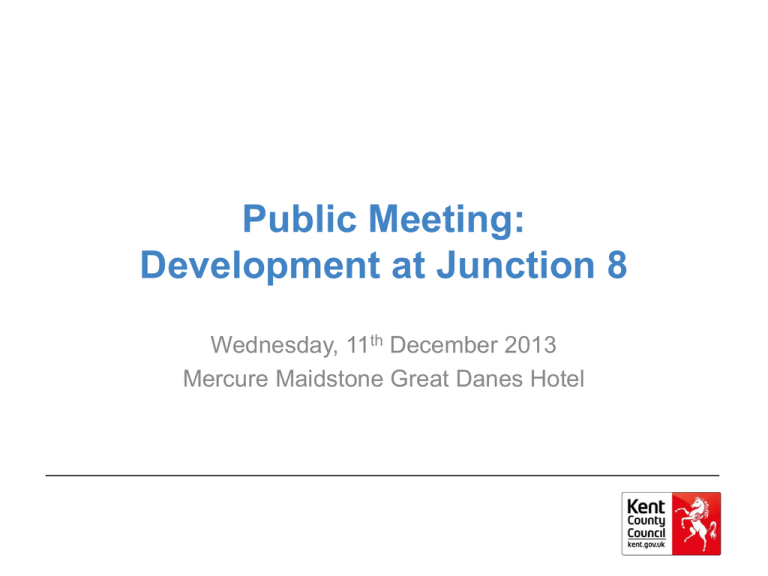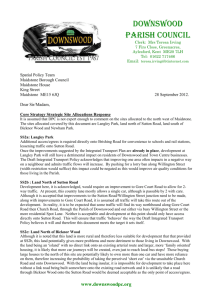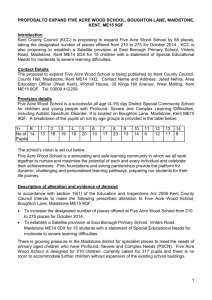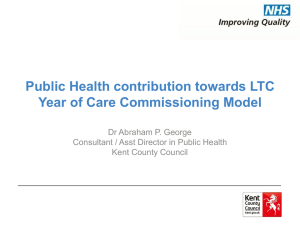Public Meeting: Development at Junction 8
advertisement

Public Meeting: Development at Junction 8 Wednesday, 11th December 2013 Mercure Maidstone Great Danes Hotel Andrew Roach Planning Policy Manager Kent County Council Waterside Park A significant development: • 56,000m2 of light industrial/office, general industrial, warehousing, distribution. • Road access, parking • Ancillary works (landscaping, cafe, creche) • Significant earthworks/site re-grading Some Significant Concerns • Number of significant grounds of objection • Clearly defined planning policy considerations which go against the proposal • Not just relying on the expertise within KCC - our views tested by independent specialist consultants. Landscape / Visual Impact • Greenfield site in the open countryside • In the setting of the Kent Downs Area of Outstanding Natural Beauty (AONB) • Adjoining a ‘Special Landscape Area’ as designated by Maidstone Borough Council Policy Considerations National Planning Policy Framework: • 12 core planning principles, including: ‘....recognising the intrinsic character and beauty of the countryside’ Policy Considerations National Planning Policy Framework: (Para 115) ‘Great weight should be given to conserving landscape and scenic beauty in National Parks, the Broads and Areas of Outstanding Natural Beauty, which have the highest status of protection in relation to landscape and scenic beauty ...‘ Policy Considerations Maidstone Borough Wide Local Plan: (Saved, Objective 3) ‘To protect the countryside for its own sake and to restrict the development of green field sites to the minimum necessary to conform with Structure Plan development requirements; to identify and implement policies to protect areas of countryside and open space having special qualities, or achieving particular functions (such as separating urban areas).’ Policy Considerations Maidstone Borough Wide Local Plan: (Saved Policy ENV28) ‘In the countryside planning permission will not be given for development which harms the character and appearance of the area or the amenities of surrounding occupiers … ‘ Policy Considerations Emerging Maidstone Planning Policies: (As presented to MBC Cabinet, December 2013) ‘The distinctive character of the Kent Downs Area of Outstanding Natural Beauty and its setting, and the extent and openness of the Metropolitan Green Belt will be rigorously protected and maintained. Landscapes of good condition and high sensitivity will be conserved …’ Other Considerations • Kent Downs Area of Outstanding Natural Beauty Guidance & Management Plan • Kent Landscape Character Assessment • Maidstone Landscape Character Assessment Key Points 1. The site is in an important area in terms of landscape character (Within the setting of Kent Downs AONB, Open Countryside, Special Landscape Area) 2. These areas are afforded significant protection under policy (at all levels) Potential Impact A significant development: • 56,000m2 of light industrial/office, general industrial, warehousing, distribution. • Road access, parking • Ancillary works (landscaping, cafe, creche) • Significant earthworks/site re-grading The most significant impacts: • Re-grading/earthworks – significant changes to topography and landform. • Development design which is not sympathetic to the landscape character of the area (large, bulky ‘industrial’ buildings) These Concerns are Shared By: • Kent Downs AONB Unit • Noted in an independent review as potentially the most significant issue for the proposal • Natural England (objection to allocation) • Backed up by previous decisions from the Planning Inspectorate (KIG development) Employment Land Allocations • Is this the most appropriate site for this type of development? • Is it needed in this location? • Will there be impact on the Maidstone Town Centre? • Are there other more appropriate sites? Policy Considerations • Policy at all levels sets mechanisms for determining appropriate locations for employment development. • Considerations include how much employment space is needed, the impact on existing town centres, availability of infrastructure ... Is The Site Needed to Satisfy Demand? • Maidstone Borough Council’s Employment Land Forecast (March 2013) showed a decrease in need for industrial, but an increased need for office space. • The Report to Maidstone Borough Cabinet (March 2013) said: ‘...based on this evidence, the justification to release employment land near Junction 8 is less clear cut than previously’ Impact on Maidstone Town Centre? • The proposal states that it aims to provide: ‘9,531 m2 of required and speculative office floorspace’ • Would this not be better off located on identified sites near to Maidstone town centre, so as to protect the viability of Maidstone? Alternative Sites: • Are there alternate sites within near proximity that are more suited to such a development (meets the needs of the developer, and the community, without significant impacts). • Needs further consideration by the developer. Alternative Sites? The Report to Maidstone Borough Cabinet (March 2013) also stated that: ‘... it is recognised that there is a stock of industrial and warehousing land in nearby authorities, in particular in Swale, Medway and Ashford which is currently available to meet market needs.’ Other Impacts • Loss of Agricultural Land • Poorly located in terms of access to public transport infrastructure, walking, cycling, buses and rail. • Lead to increased impacts on road network, including local roads • Adverse impacts on air quality • Cumulative impact of development in the Junction 8 corridor. • Potential harm to existing areas of historical significance, setting of nearby Bearsted • Impacts on operation of other (tourism) dominated businesses – including Leeds Castle. • Cumulative impact of a succession of such developments Well Known Issues: The issues for this site are well known, primarily as a result of: 1. Previous Applications and potential for emerging applications in the area (KIG, Woodcut Farm); and 2. Consideration of the Junction 8 location as strategic locations for employment by Maidstone Borough Council. Some Useful Information • Potential for employment uses in this location have been examined previously, including: • Sustainability Appraisal undertaken by MBC • Inspectors Report for KIG site Sustainability Appraisal Scored negatively on a number of key criteria: • Poorly located in terms of transport and beyond easy walking distance from bus routes/trains • Increase congestion on the road network, including significant impact on local road network • Lead to increased noise, including traffic noise Sustainability Appraisal • Loss of valuable agricultural land, including grade 2 and 3 agricultural land • Adverse impact on air quality, • Impacts in terms of archaeological heritage, and listed buildings, as well impact on the amenity of nearby villages (such as Bearsted) Sustainability Appraisal • Potential impact on sites within the town centre. • Significant Landscape Impacts KIG Appeal Appeal dismissed primarily on the basis of: • Loss of open countryside • Landscape Impacts, including impact on the setting of the Kent Downs AONB KIG Appeal • Impact on Conservation Areas and Historical Items (including the setting of Bearsted). • The availability of other, more suitable sites to accommodate the development • ‘Serious damage to the attractiveness and amenity value...’ of bridleways, public access areas KIG Appeal Regarding Impacts on Bearsted: ‘...the proposal would cause moderate harm to the character of the Bearsted Green Conservation Area and some limited harm to the Bearsted Holy Cross Conservation Area. Consequently ... the proposal runs counter to the desirability of preserving or enhancing the character of conservation areas...’ And ‘... the overall impact would materially degrade the present ambience of Bearsted.’ KIG Appeal Regarding the AONB/Landscape Issues: ‘...the appearance and scale of the development would be alien and out of character with the countryside and the existing built-form of neighbouring settlements, and that it would cause substantial harm to the setting of the AONB.’ John Horne Chairman Joint Parishes Group Richard Knox-Johnston Vice President and Ambassador CPRE Protect Kent Paul Carter Leader Kent County Council Question & Answer Session Chair Iain McBride Panel Members Paul Carter, Leader, KCC John Horne, Chairman, Joint Parishes Group Richard Knox-Johnston, Vice President and Ambassador, CPRE Protect Kent Closing Remarks Iain McBride Local journalist and ITV Meridian correspondent










